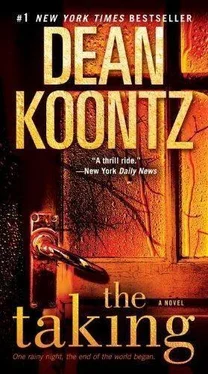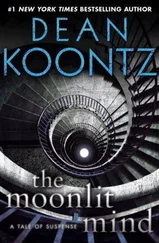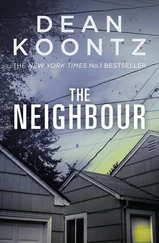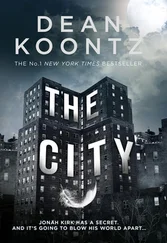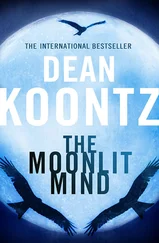The thick mist was empurpled again, and the street cast into false twilight, as before.
After hugging Abby almost too fiercely, Molly rose shakily to her feet. Neil stood with one reassuring hand on Johnny's shoulder. His eyes met hers, and did not blink.
Their mutual sense of relief was palpable, but none of them had a word to say about the event that had just transpired, as though to speak of the craft would be to invite its immediate return.
During the encounter, she had not been aware of the dog. If he had been frightened, he had recovered as quickly as the vessel had vanished in the fog. He stood, alert and apparently undaunted, ready to lead the search for other children.
Molly was eager to follow him-and grateful to have a purpose important enough and difficult enough to prevent her from brooding too intently on the hostile new world they would have to face in the days ahead.
Nonetheless, as Virgil led them farther north along the street, Molly noticed that the radiant lichen crusted a significant number of trees: stone pines, sugar pines, sycamores dressed with the yellow foliage of autumn. The transformation of the earth continued apace.
She saw other sycamores and cottonwoods with beards of gray moss like nothing that previously had grown in Black Lake. Some of this mossy bunting hung in swags as wispy as the mist, but other drapings were dense, conveying an impression of rot and disease.
Two massive trees had toppled, but their fate appeared to have nothing to do with aggressive alien plant forms. They had stood in soil so saturated by the rains that their weight was greater than the power of the sodden earth to hold them erect. One tree had fallen into the street, entirely blocking it, and the other had crashed onto a house, doing serious damage.
Never wandering, never pausing to sniff the ground or the air, Virgil proceeded one block farther north, then turned east and trotted uphill to Chestnut Lane.
Molly expected to be led to another residence, in which the walls would be infested. Perhaps this time the fluttering multitudes would escape their hive and seek whatever sustenance they needed.
The shepherd took them instead toward St. Perpetua's, the church at the corner of Chestnut Lane and Hill Street, the steeple and the roof of which thrust up and vanished into the overcast.
This structure had been built of stone quarried from these mountains. The two oak front doors stood under handsome limestone tympanums that together cradled a stained-glass rose window, all surrounded by a cinquefoil arch.
The north and south walls of the church also featured stained-glass windows. Through two of these, toward the altar-end of the nave, came a constant but slightly quivering light, not nearly strong enough to transform the mosaics of somber glass into bright scenes of grace and miracles, but sufficient to reveal that someone had taken refuge in the building.
Earlier, when Molly and Neil had quickly toured the town in search of neighbors gathered in mutual defense, before finding the crowd at the tavern, they'd cruised past St. Perpetua's. It had appeared to be deserted.
Virgil did not proceed to the front doors of the church. He went to the open gate in the wrought-iron fence that surrounded the adjacent cemetery.
There, the dog exhibited his first moment of trepidation: ears forward, breath held, tail tucked. From rump to stifles to hocks, his back legs trembled.
Yet after only a brief hesitation, the shepherd went through the gate and among the tombstones. Molly, Neil, and the children reluctantly followed.
Two ancient live oaks, growing at maximum altitude and unlikely to have survived higher on the mountain, shadowed the farther reaches of the cemetery. Their massive crowns were for the most part cloaked in the fog, and the aisles of graves under their limbs were obscured by filigrees of blackest shadows worked across a field of purple light.
In those open areas closer to the gate, however, the enduring and anachronistic twilight brightened the yard enough to reveal that some gravestones had been targeted by busy vandals. Simple rectangles of granite, carved angels, two Latin crosses, one cross of Calvary, one Celtic cross, molines and botonees and patriarchals had been toppled and broken.
Graves had been opened. Not most. Perhaps a dozen, fifteen, out of hundreds.
Young Abby sought Molly's hand and squeezed it tightly.
Masses of mud, excavated earth, covered some areas of grass. Scattered across the mud were coffin lids of all varieties: shattered wood, twisted and mangled metal.
The open graves were nearly full of muddy water. In them floated tangled lengths of satin lining from the caskets. A stained and lace-trimmed pillow on which had once rested the head of a cadaver. One black shoe. Scraps of rotting garments. A few small bones, clean and white, mostly phalanges and metatarsals
The dog had brought them here to see this.
Molly had no idea why.
Or perhaps she knew the meaning of this outrage, but lacked the nerve to follow logic where it would take her.
THE NARTHEX OF THE CHURCH HAD A SINGLE WINDOW: the stained-glass, multifoliate rose above the front doors. When filtered through red-and-gold glass, the plum light lost all ability to illuminate.
This was a dark place, paneled in mahogany. The air smelled sweet with incense and rank with mold.
The dog sneezed twice, and snorted to clear his nose.
Molly's flashlight found a colony of fungi in a corner, not black and yellow but pure white.
The specimen consisted of two forms growing in an apparently random mix. Round bladderlike structures clustered in many sizes, swollen as if with a barely contained quantity of fluid, glistening with an exuded milky mucus. What appeared to be soft fabric sacs, not quite fully inflated, slowly swelled and subsided and swelled again as though they were lungs.
The colony measured approximately four feet wide, three feet deep, and six feet high. Massive. Malignant. Aware.
How Molly knew it was aware, she could not say, and perhaps she reached this conclusion largely by imagination rather than by reason or even intuition. Yet she remained certain that the interiors of the white bladders, if not the pale lungs, teemed with malevolent and sentient life.
She wished that Abby and Johnny could have waited outside. The kids couldn't be left alone, however, and neither she nor Neil was ready to compromise their commitment to stay together at all times.
Virgil pawed at the door between the narthex and the nave, pawed with such insistence that he seemed to suggest they had little time to do what must be done.
When Molly pushed the door open, she glimpsed a white marble holy-water font immediately to the right, but was more drawn to the sight of scores of candles clustered at the front of the church, toward the extreme right side of the chancel railing.
By habit, she dipped two fingers in that small marble reservoir. Instead of cool water and the usual sense of peace, she felt a damp, spongy, foul something.
Snatching her fingers back, aiming the flashlight more directly at the font, she discovered a severed human hand lying in the water. Palm up. Digits bristling like the legs of a dead crab.
A cry caught in her throat, then issued as half whimper and half wheeze.
A thing as familiar as a hand, in such unexpected and offensive context, seemed alien in the extreme, less grisly than shocking, but grisly enough.
To spare the children from this sight, Molly at once turned the flashlight away from the font, toward the main aisle of the shadowy nave. Twitching on the wooden floor, the beam revealed her state of mind.
"Stay away from the font, don't even look at it," she warned them, and hoped that the poor light would spare them the sight now etched in her memory.
Читать дальше
Конец ознакомительного отрывка
Купить книгу
